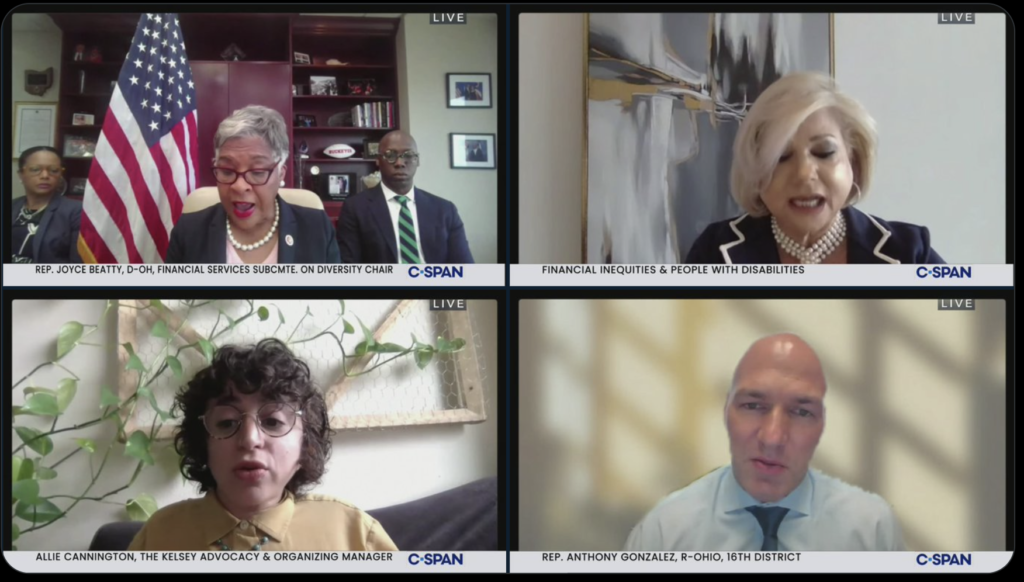
On May 24, 2022, The Kelsey’s Sr. Manager of Advocacy & Organizing, Allie Cannington, presented testimony before the House Committee on Financial Services, Subcommittee on Diversity and Inclusion, Hearing on Diversity Includes Disability: Exploring Inequities in Financial Services for Persons with Disabilities, Including Those Newly Disabled Due to Long-Term COVID. Allie’s opening remarks are below, as well as a summary of the written testimony which was submitted for public record. Allie spoke to the systematic housing barriers faced by disabled people and what federal remedies are necessary for creating a truly disability-forward housing future.
Opening Statement
“Chairwoman Beatty and Ranking Member Gonzalez, and members of the Diversity and Inclusion Subcommittee, thank you for inviting me to testify today. My name is Allie Cannington, a white queer disabled jew living in Oakland, CA, who has been organizing in the cross-disability rights movement for over a decade. Currently, I am the Senior Manager of Advocacy and Organizing at The Kelsey, where we pioneer disability-forward housing solutions that open doors to more affordable homes and opportunities for everyone. We have over 240 affordable, accessible, integrated, and inclusive homes in our pipeline and we lead initiatives to support market and policy conditions that can make inclusive housing the norm.
Today, I will provide an overview of how disabled people, the most diverse and largest minority population, are disproportionately impacted by our nation’s housing crisis. Housing has failed to be Affordable – meaning affordable to people of all the incomes, especially those who are extremely low income, Accessible – meaning housing is located, designed, and built to meet cross-disability access, Integrated – meaning housing that does not segregate or isolate, but is mixed between people with and without disabilities and Inclusive – meaning supportive communities where people can access the programs and supports that they need to thrive in and around where they live.
While we do have a federal legal framework in place including, The Fair Housing Act which “prohibited discrimination because of race, color, national origin, religion, sex, familial status, and disability” and The Americans with Disabilities Act requiring public entities to “administer services, programs, and activities in the most integrated setting”. The Olmstead Supreme Court decision which confirmed that under Title II of the ADA, disabled people have the right to community integration. We have never invested in the housing infrastructure to make these rights a felt reality for the ever-growing disabled population.
Today, there are more than 61 million people with disabilities living in US and due to Covid-19, initial estimates said by end of 2021, there were 1.2 million more disabled people. The Disabled population has and will continue to rise. And the reality is, people with disabilities are twice as likely to live in poverty and the millions who rely on SSI cannot afford housing in any US market. 55% percent of all housing discrimination is based on disability, the highest rates of discrimination experienced across any protected class. At minimum 40% of people experiencing homelessness are disabled and 1 in 2 people turning to shelters are people with disabilities. Less than 12% of people with intellectual and developmental disabilities rent or own a home. Segregated housing models still prevail, the institutional bias is intact and federal and state governments have never invested in a commensurate supply of service-ready, integrated housing upon the massive closures of institutions. These housing crises are disproportionately experienced by Black, Brown, Indigenous, and immigrants with disabilities.
The federal government can, and must, invest in the housing infrastructure so that all people with disabilities, regardless of their backgrounds, identities, and level of support needs, can live in their own homes and communities. This committee has the ability to fund, mandate, and guide the development of needed solutions, which must be co-created by Disabled people. For example vouchers, especially mainstream and 811 project-based rental assistance, which ensure people with disabilities can afford housing and that disability-inclusive projects are built. Accessibility requirements can be increased and coupled with funding incentives that encourage housing to be built and operated beyond minimum requirements for cross-disability access. Stronger guidance can come from the federal government that better aligns various funding sources and meets and affirms the housing investments needed to fulfill the integration mandate of the ADA. Innovative policies and robust funding can make it more feasible, easier, and clearer for housing developers and municipalities to advance inclusive, accessible, and affordable housing.
More details on both the need and the remedies are included in my written testimony and I look forward to exploring more with this committee on what can be done to support a truly disability-forward housing future. Thank you.”
You can find Allie’s full written testimony, here, in which they share how this work is also deeply personal.
“I have also struggled to find housing that is affordable, accessible, and inclusive to my needs. Time and again, regardless of the city I have lived in, my only housing options have meant that I have always been severely rent-burdened. All of the naturally occurring affordable housing was never accessible nor close enough to public transportation. Yet, even with being rent-burdened, I am still in the minority of disabled people who are living in safe, accessible, transit-oriented, integrated housing. Beyond my own experiences, a decade of organizing in the disability rights movement has confirmed that one of the highest priority issues impacting disabled people is the lack of affordable, accessible, and/or integrated housing.”
Allie Cannington, Manager of Advocacy and Organizing